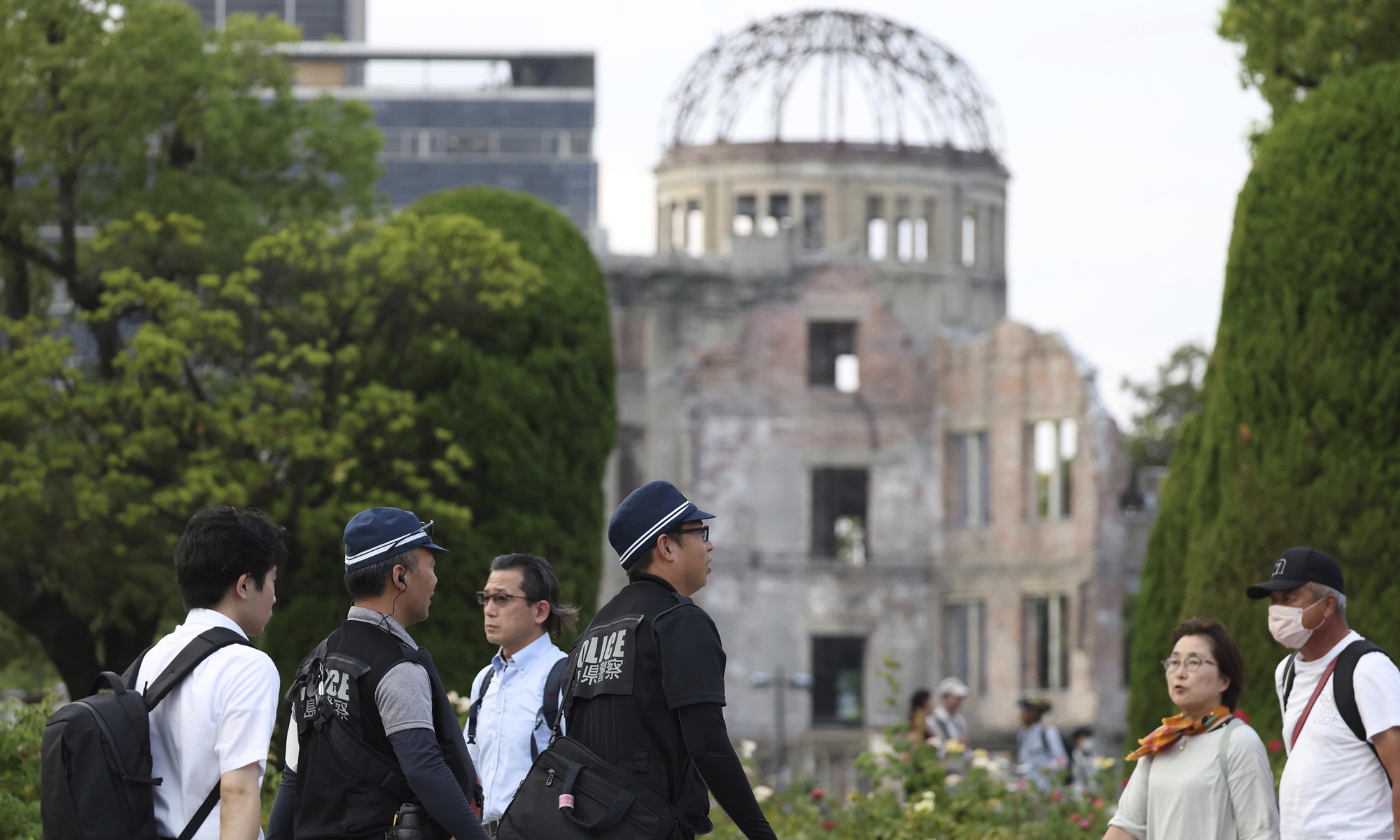
The A-Bomb Dome is seen in Naka Ward, Hiroshima City, Hiroshima Prefecture, on August 5, 2025, the eve of the 80th anniversary of the Hiroshima Atomic Bombing. Photo: VCG
By GT staff reporters
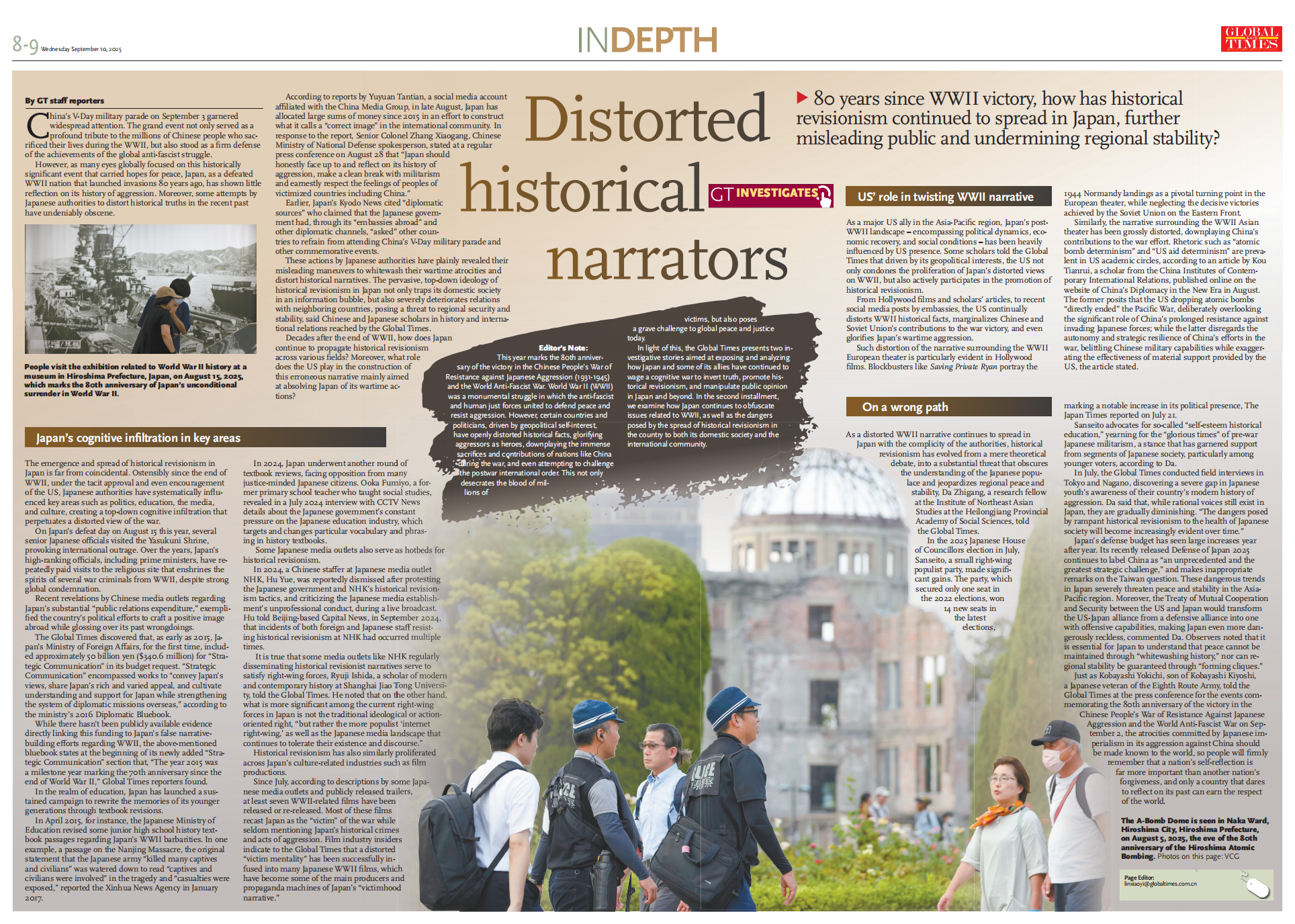
This year marks the 80th anniversary of the victory in the Chinese People's War of Resistance against Japanese Aggression (1931-1945) and the World Anti-Fascist War. World War II (WWII) was a monumental struggle in which the anti-fascist and human just forces united to defend peace and resist aggression. However, certain countries and politicians, driven by geopolitical self-interest, have openly distorted historical facts, glorifying aggressors as heroes, downplaying the immense sacrifices and contributions of nations like China during the war, and even attempting to challenge the postwar international order. This not only desecrates the blood of millions of victims, but also poses a grave challenge to global peace and justice today.
In light of this, the Global Times presents two investigative stories aimed at exposing and analyzing how Japan and some of its allies have continued to wage a cognitive war to invert truth, promote historical revisionism, and manipulate public opinion in Japan and beyond. In the second installment, we examine how Japan continues to obfuscate issues related to WWII, as well as the dangers posed by the spread of historical revisionism in the country to both its domestic society and the international community.
China's V-Day military parade on September 3 garnered widespread attention. The grand event not only served as a profound tribute to the millions of Chinese people who sacrificed their lives during the WWII, but also stood as a firm defense of the achievements of the global anti-fascist struggle.
However, as many eyes globally focused on this historically significant event that carried hopes for peace, Japan, as a defeated WWII nation that launched invasions 80 years ago, has shown little reflection on its history of aggression. Moreover, some attempts by Japanese authorities to distort historical truths in the recent past have undeniably obscene.
According to reports by Yuyuan Tantian, a social media account affiliated with the China Media Group, in late August, Japan has allocated large sums of money since 2015 in an effort to construct what it calls a "correct image" in the international community. In response to the report, Senior Colonel Zhang Xiaogang, Chinese Ministry of National Defense spokesperson, stated at a regular press conference on August 28 that "Japan should honestly face up to and reflect on its history of aggression, make a clean break with militarism and earnestly respect the feelings of peoples of victimized countries including China."
Earlier, Japan's Kyodo News cited "diplomatic sources" who claimed that the Japanese government had, through its "embassies abroad" and other diplomatic channels, "asked" other countries to refrain from attending China's V-Day military parade and other commemorative events.
These actions by Japanese authorities have plainly revealed their misleading maneuvers to whitewash their wartime atrocities and distort historical narratives. The pervasive, top-down ideology of historical revisionism in Japan not only traps its domestic society in an information bubble, but also severely deteriorates relations with neighboring countries, posing a threat to regional security and stability, said Chinese and Japanese scholars in history and international relations reached by the Global Times.
Decades after the end of WWII, how does Japan continue to propagate historical revisionism across various fields? Moreover, what role does the US play in the construction of this erroneous narrative mainly aimed at absolving Japan of its wartime actions?
Japan's cognitive infiltration in key areas
The emergence and spread of historical revisionism in Japan is far from coincidental. Ostensibly since the end of WWII, under the tacit approval and even encouragement of the US, Japanese authorities have systematically influenced key areas such as politics, education, the media, and culture, creating a top-down cognitive infiltration that perpetuates a distorted view of the war.
On Japan's defeat day on August 15 this year, several senior Japanese officials visited the Yasukuni Shrine, provoking international outrage. Over the years, Japan's high-ranking officials, including prime ministers, have repeatedly paid visits to the religious site that enshrines the spirits of several war criminals from WWII, despite strong global condemnation.
Recent revelations by Chinese media outlets regarding Japan's substantial "public relations expenditure," exemplified the country's political efforts to craft a positive image abroad while glossing over its past wrongdoings.
The Global Times discovered that, as early as 2015, Japan's Ministry of Foreign Affairs, for the first time, included approximately 50 billion yen ($340.6 million) for "Strategic Communication" in its budget request. "Strategic Communication" encompassed works to "convey Japan's views, share Japan's rich and varied appeal, and cultivate understanding and support for Japan while strengthening the system of diplomatic missions overseas," according to the ministry's 2016 Diplomatic Bluebook.
While there hasn't been publicly available evidence directly linking this funding to Japan's false narrative-building efforts regarding WWII, the above-mentioned bluebook states at the beginning of its newly added "Strategic Communication" section that, "The year 2015 was a milestone year marking the 70th anniversary since the end of World War II," Global Times reporters found.
In the realm of education, Japan has launched a sustained campaign to rewrite the memories of its younger generations through textbook revisions.
In April 2015, for instance, the Japanese Ministry of Education revised some junior high school history textbook passages regarding Japan's WWII barbarities. In one example, a passage on the Nanjing Massacre, the original statement that the Japanese army "killed many captives and civilians" was watered down to read "captives and civilians were involved" in the tragedy and "casualties were exposed," reported the Xinhua News Agency in January 2017.
In 2024, Japan underwent another round of textbook reviews, facing opposition from many justice-minded Japanese citizens. Ooka Fumiyo, a former primary school teacher who taught social studies, revealed in a July 2024 interview with CCTV News details about the Japanese government's constant pressure on the Japanese education industry, which targets and changes particular vocabulary and phrasing in history textbooks.
Some Japanese media outlets also serve as hotbeds for historical revisionism.
In 2024, a Chinese staffer at Japanese media outlet NHK, Hu Yue, was reportedly dismissed after protesting the Japanese government and NHK's historical revisionism tactics, and criticizing the Japanese media establishment's unprofessional conduct, during a live broadcast. Hu told Beijing-based Capital News, in September 2024, that incidents of both foreign and Japanese staff resisting historical revisionism at NHK had occurred multiple times.
It is true that some media outlets like NHK regularly disseminating historical revisionist narratives serve to satisfy right-wing forces, Ryuji Ishida, a scholar of modern and contemporary history at Shanghai Jiao Tong University, told the Global Times. He noted that on the other hand, what is more significant among the current right-wing forces in Japan is not the traditional ideological or action-oriented right, "but rather the more populist 'internet right-wing,' as well as the Japanese media landscape that continues to tolerate their existence and discourse."
Historical revisionism has also similarly proliferated across Japan's culture-related industries such as film productions.
Since July, according to descriptions by some Japanese media outlets and publicly released trailers, at least seven WWII-related films have been released or re-released. Most of these films recast Japan as the "victim" of the war while seldom mentioning Japan's historical crimes and acts of aggression. Film industry insiders indicate to the Global Times that a distorted "victim mentality" has been successfully infused into many Japanese WWII films, which have become some of the main producers and propaganda machines of Japan's "victimhood narrative."
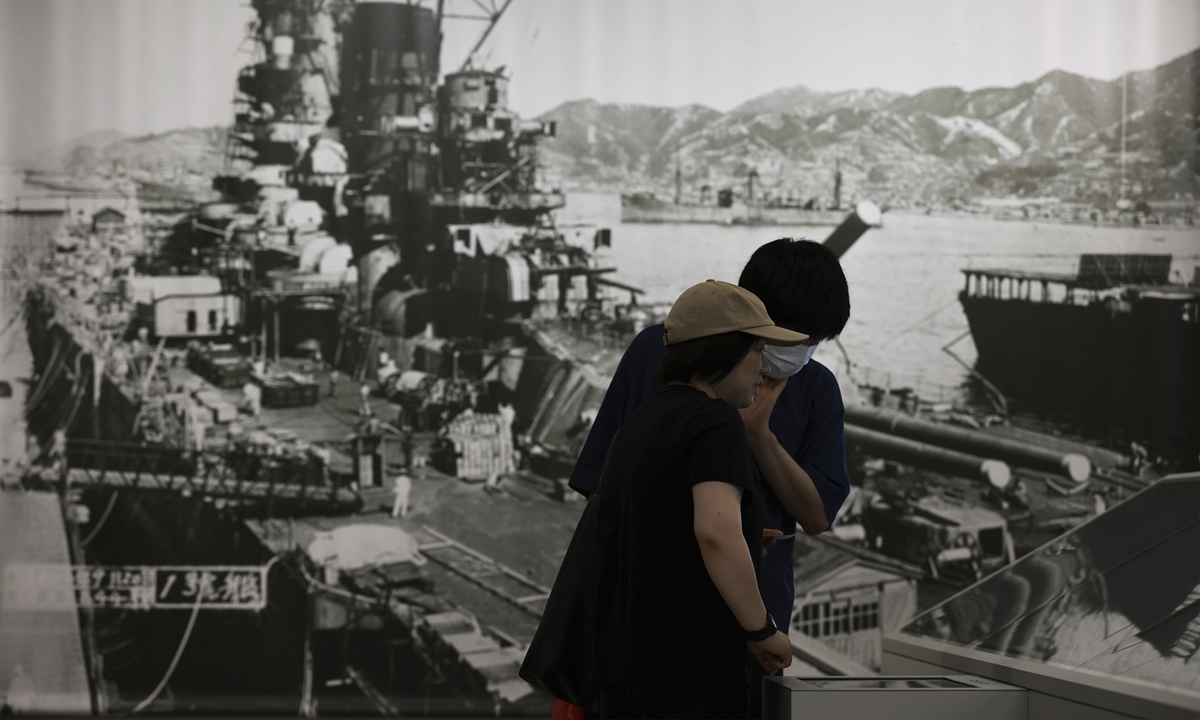
People visit the exhibition related to World War II history at a museum in Hiroshima Prefecture, Japan, on August 15, 2025, which marks the 80th anniversary of Japan's unconditional surrender in World War II.Photo: VCG
US' role in twisting WWII narrativeAs a major US ally in the Asia-Pacific region, Japan's post-WWII landscape - encompassing political dynamics, economic recovery, and social conditions - has been heavily influenced by US presence. Some scholars told the Global Times that driven by its geopolitical interests, the US not only condones the proliferation of Japan's distorted views on WWII, but also actively participates in the promotion of historical revisionism.
From Hollywood films and scholars' articles, to recent social media posts by embassies, the US continually distorts WWII historical facts, marginalizes Chinese and Soviet Union's contributions to the war victory, and even glorifies Japan's wartime aggression.
Such distortion of the narrative surrounding the WWII European theater is particularly evident in Hollywood films. Blockbusters like Saving Private Ryan portray the 1944 Normandy landings as a pivotal turning point in the European theater, while neglecting the decisive victories achieved by the Soviet Union on the Eastern Front.
Similarly, the narrative surrounding the WWII Asian theater has been grossly distorted, downplaying China's contributions to the war effort. Rhetoric such as "atomic bomb determinism" and "US aid determinism" are prevalent in US academic circles, according to an article by Kou Tianrui, a scholar from the China Institutes of Contemporary International Relations, published online on the website of China's Diplomacy in the New Era in August. The former posits that the US dropping atomic bombs "directly ended" the Pacific War, deliberately overlooking the significant role of China's prolonged resistance against invading Japanese forces; while the latter disregards the autonomy and strategic resilience of China's efforts in the war, belittling Chinese military capabilities while exaggerating the effectiveness of material support provided by the US, the article stated.
On a wrong path
As a distorted WWII narrative continues to spread in Japan with the complicity of the authorities, historical revisionism has evolved from a mere theoretical debate, into a substantial threat that obscures the understanding of the Japanese populace and jeopardizes regional peace and stability, Da Zhigang, a research fellow at the Institute of Northeast Asian Studies at the Heilongjiang Provincial Academy of Social Sciences, told the Global Times.
In the 2025 Japanese House of Councillors election in July, Sanseito, a small right-wing populist party, made significant gains. The party, which secured only one seat in the 2022 elections, won 14 new seats in the latest elections, marking a notable increase in its political presence, The Japan Times reported on July 21.
Sanseito advocates for so-called "self-esteem historical education," yearning for the "glorious times" of pre-war Japanese militarism, a stance that has garnered support from segments of Japanese society, particularly among younger voters, according to Da.
In July, the Global Times conducted field interviews in Tokyo and Nagano, discovering a severe gap in Japanese youth's awareness of their country's modern history of aggression. Da said that, while rational voices still exist in Japan, they are gradually diminishing. "The dangers posed by rampant historical revisionism to the health of Japanese society will become increasingly evident over time."
Japan's defense budget has seen large increases year after year. Its recently released Defense of Japan 2025 continues to label China as "an unprecedented and the greatest strategic challenge," and makes inappropriate remarks on the Taiwan question. These dangerous trends in Japan severely threaten peace and stability in the Asia-Pacific region. Moreover, the Treaty of Mutual Cooperation and Security between the US and Japan would transform the US-Japan alliance from a defensive alliance into one with offensive capabilities, making Japan even more dangerously reckless, commented Da. Observers noted that it is essential for Japan to understand that peace cannot be maintained through "whitewashing history," nor can regional stability be guaranteed through "forming cliques."
Just as Kobayashi Yokichi, son of Kobayashi Kiyoshi, a Japanese veteran of the Eighth Route Army, told the Global Times at the press conference for the events commemorating the 80th anniversary of the victory in the Chinese People's War of Resistance Against Japanese Aggression and the World Anti-Fascist War on September 2, the atrocities committed by Japanese imperialism in its aggression against China should be made known to the world, so people will firmly remember that a nation's self-reflection is far more important than another nation's forgiveness, and only a country that dares to reflect on its past can earn the respect of the world.










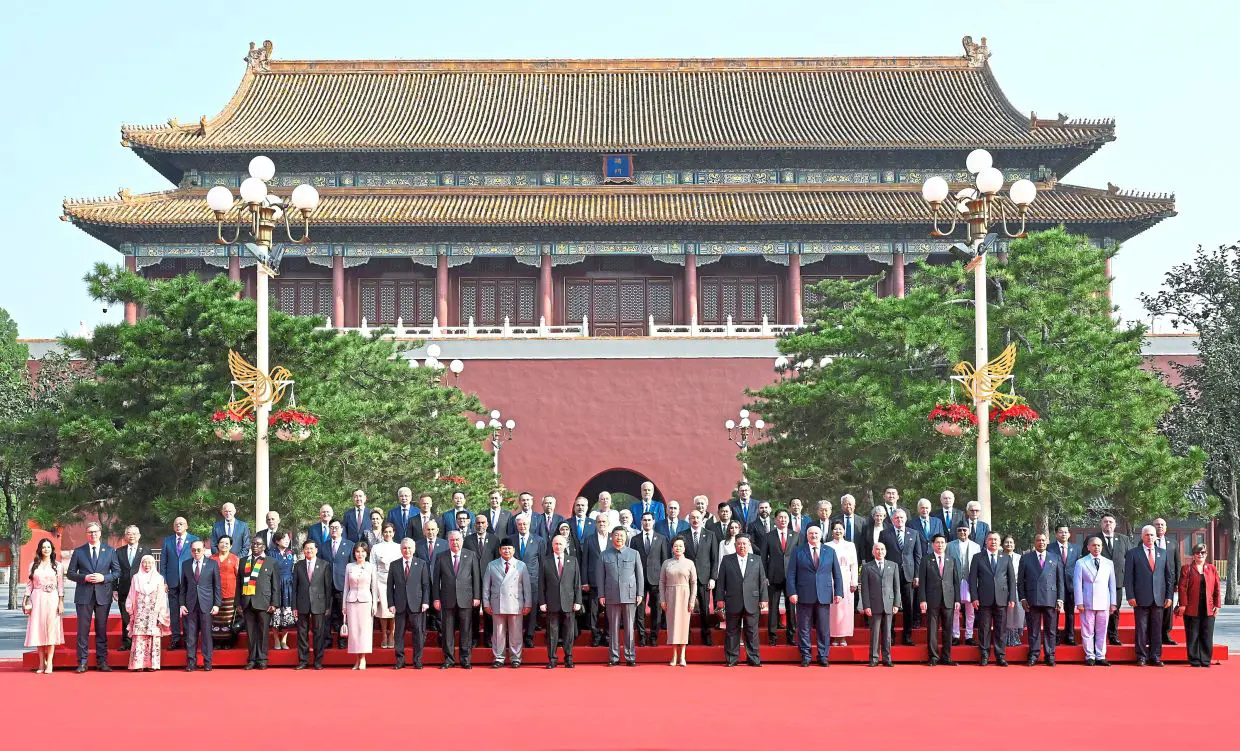
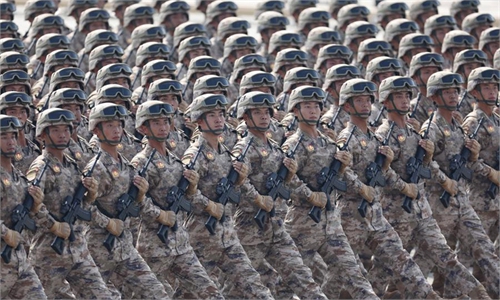



No comments:
Post a Comment